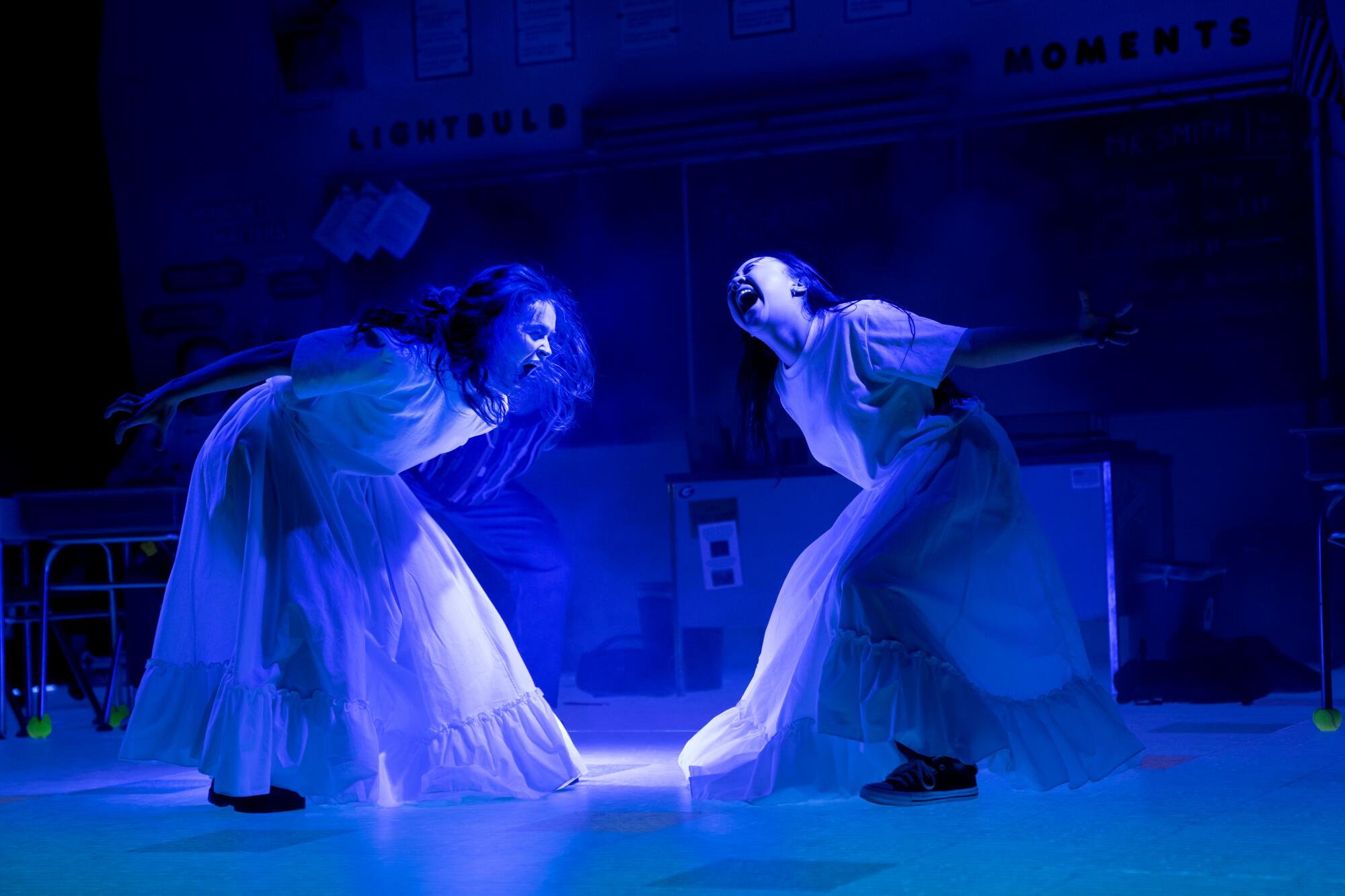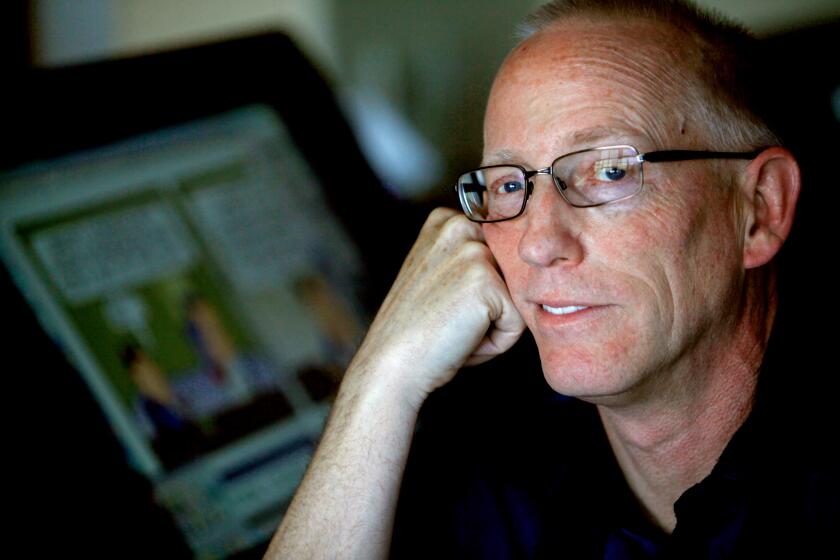
Playwright Kimberly Belflower and director Danya Taymor reveal how the Tony-nominated play ‘John Proctor Is the Villain’ made it to Broadway, with help from ‘Stranger Things’ star Sadie Sink and pop star Lorde.
- Share via
New York — “John Proctor Is the Villain,” the title of Kimberly Belflower’s Tony-nominated play, has a strong polemical ring. Before seeing the work, I assumed that the author was picking a fight with Arthur Miller, whose play “The Crucible” immortalized the historical figure of John Proctor as a conscience-stricken hero.
Belflower began the play as the #MeToo movement was gaining momentum, but she has too much humor and sympathy to write a programmatic screed. Her drama is not only much more subtle; it is also a good deal more surprising. The production at the Booth Theatre, directed by Danya Taymor and starring Sadie Sink from Netflix’s “Stranger Things,” casts a mysterious spell that I’m still processing a month later.
Set in a cheery high school classroom in small town Georgia, the play tracks students as they tackle Miller’s “The Crucible” with their charismatic teacher, Mr. Smith (played to perfection by Gabriel Ebert), during the spring semester of their junior year. As the five young women in the class reflect on Miller’s play about the 1692 witch trials in Salem, Mass., an allegory for the anti-Communist hysteria of the McCarthy era, they begin to depart from the standard interpretation that minimizes the experiences of the female characters.
Don’t be fooled by the school setting: There’s nothing academic about “John Proctor Is the Villain.” The students, who include two teenage boys, are too spirited to fall in line with the received wisdom of their teacher, whose own character comes under critical scrutiny along with that of Miller’s Proctor as the students begin sharing private experiences that shed light on the hypocrisies of the adult world. (A school counselor, still finding her feet, has her hands full.)

Sink plays Shelby, the radical in the class with a reputation for trouble. She’s been mysteriously absent, but when she returns in a blaze of red hair and rebellious fury, she challenges the other girls to rethink not only what they know about literature but also about what they understand about themselves.
The play reaches a climax that, echoing feverish events in “The Crucible,” explodes in a burst of interpretive dancing to Lorde’s “Green Light.” Trust me, no matter how many times you’ve heard this hit single, you’ve never experienced it quite like this. The effect, which spoke to a different part of my brain than is usually accessed in the theater, communicated something profound about gender politics — and not in intellectual abstractions but in the liberated movement of defiant bodies and souls.
The idea for the play came to Belflower shortly after she received her MFA from the University of Texas at Austin in 2017. That summer she read Stacy Schiff’s book “The Witches: Salem, 1692,” which expanded the historical context that Miller’s play selectively draws on.
“I’m always interested in things that broaden the lens that we’re already given,” Belflower said during an interview in Midtown Manhattan, not far from the theater. “A lot of Shelby’s arguments about the girls in Miller’s play having PTSD from the assaults that were so rampant in the town were things that I learned from that book. I was just blown away by the way [Schiff] reframed a moment that I thought I understood.”
But something even more momentous was about to shift the playwright’s frame of reference. “That fall, the tidal wave of #MeToo broke,” Belflower said, pointing to the allegations of sexual misconduct against Harvey Weinstein that were published in the New York Times and the New Yorker in October 2017. “Like a lot of people I know, especially women, I was really consumed by every new allegation. I started looking back at my own adolescence and young adulthood with a new vocabulary. And I was like, ‘Oh, that wasn’t just like a weird moment. That was this. That guy wasn’t just creepy.’ ”

A BBC interview with Woody Allen, in which he called the #MeToo movement a witch hunt, was a eureka moment for Belflower. “Since I was a kid, I’ve always tried to make sense of the world around me through the books I read and the culture I consume,” she said. “And so I reread ‘The Crucible,’ which is like the most famous work of art about witch hunts.”
Returning to Miller’s classic at this cultural turning point left her with a starkly different impression of John Proctor. The imperfect protagonist of “The Crucible” takes a heroic stand against the mass hysteria that is turning his Salem neighbors viciously against one another. But his own adulterous misdeeds and patriarchal presumptions make him vulnerable to critiques that extend beyond the scope of Miller’s drama.
“We talked a lot in our rehearsal process that multiple things can be true,” Belflower said. “I think John Proctor is a good man and does all of these incredible moral things. But this other thing is also true. He was awful to every woman in the play.”
Belflower, a Georgia native who teaches at Emory University, has a quick mind and a gracious Southern manner. There was no trace of the ideologue as she harked back to the origins of “John Proctor Is the Villain.”
“Because I had been looking back on my own formative years through the lens of #MeToo and because I first read ‘The Crucible’ in high school, I was like, ‘Wow, I am 30 and I don’t recognize my life and the world around me through this movement. What would it be like to be coming of age at this moment? What would it be like to be a 16-year-old?’ So that’s kind of how it all swirled around.”
“John Proctor,” which has received numerous college productions, is the rare case of a campus hit becoming a New York sensation. As Belflower was commenting on her play’s unusual path to Broadway, Taymor arrived to join the conversation. It was just after 9 a.m., and the in-demand director was on a tight schedule. A day of auditions for the tour of “The Outsiders,” the Tony-winning musical that earned her a Tony Award for her direction, awaited her.
Although she was catapulted into the spotlight for a musical, Taymor, who happens to be the niece of Tony-winning director Julie Taymor, has an impressive track record of collaborating with boldly innovative playwrights, among them Will Arbery, Jeremy O. Harris, Antoinette Chinonye Nwandu and Martyna Majok.
“The majority of my career has been working on new plays by new writers,” she said. The only dead playwright I’ve ever directed is Beckett, but I tried to treat ‘Endgame’ like a new play too. I even treated ‘The Outsiders’ like a new play. Part of the reason the musical made sense for me is that I’m a rhythm-focused director. I think about the cadence of a particular writer’s style, and the way a play should feel in the mouths and in the bodies of the performers.”
This heightened acoustical sense drew Taymor to Belflower’s play. “Kimberly’s rhythm on the page is so clear,” she said. “The line breaks, the beats, the pauses — to me, that is like music. I do tell the cast of ‘John Proctor’ that they’re a nine-piece orchestra and that there are all these different variations on how they play together.”
Commissioned by Farm Theater’s College Collaboration Project and developed with Centre College, Rollins College and Furman University, “John Proctor” was part of the 2019 Ojai Playwrights Conference’s New Works Festival. Times culture critic Mary McNamara wrote a column about how this play about John Proctor and #MeToo cured her of her aversion to theatrical works-in-progress.

Before the pandemic, Belflower and Taymor had discussed working together on the play’s first production. Schedules didn’t align, and then the COVID-19 shutdown happened. “John Proctor” had its world premiere at Studio Theatre in Washington, D.C., in 2022. Taymor assumed that she had missed her chance. But then Sink, who was looking to do something on stage, read the play and opportunity knocked again.
“Sadie, her people and the producers were like, ‘We think Danya Taymor would be great for this,’ ” Belflower recalled. “And I’m like, ‘Wow, yeah, me too!’ So it was like witchcraft.”
It would be hard to imagine a more well-tuned cast than the one Taymor assembled. Sink, Ebert and Fina Strazza, who plays Beth, the eager-beaver of the class, all received Tony nominations. Sink is up for lead actress in a play, in a performance of fiery vulnerability. But it’s a true ensemble production.
“Sadie read this play and activated this moment of its life,” Taymor said. “She wanted to lend her power to something new on Broadway. Sadie is incredible as an actor and a company leader and someone who is just so humble and grounded in the group.”
Although posing a revisionist challenge to “The Crucible,” “John Proctor” received the blessing of the Arthur Miller estate. It’s a testament to the playwright’s long history of defending free speech and artistic freedom.
“The agent who represents the estate read the play and really got what I was going for,” Belflower said. “My play is not going to knock ‘The Crucible’ off its pedestal. It’s a great play. I love ‘The Crucible.’ I love Arthur Miller, and my play is not going to do anything to his legacy. If you’re in the canon and the work is strong and belongs there, then it should be able to withstand questioning and prodding and widening. So I think that the estate has really smart people.”
“The Crucible” is particularly resonant at a time when self-censorship is on the rise in America and dissent can be grounds for deportation. I’ll admit that I felt slightly protective of the play until I saw “John Proctor.” Belflower isn’t out to cancel “The Crucible.” She trying to deepen the conversation with an undisputed American classic.
“I’ve been asked if this is my Arthur Miller hit piece,” Belflower said. “Why would I want to spend years of my life trying to make something in conversation with something that I hate? That sounds miserable.”
The anti-woke brigade naturally assumes that this is just another play about toxic white masculinity. But to that reductive objection, Belflower has a polite retort: “OK, but look at the history.”

“Some of the characters who do the worst things in the play are the characters with these redeeming qualities that you fall in love with,” Taymor said. “What do we do when it’s not a ‘monster’? Some people want to reject the question. Some are willing to wrestle with it.”
“John Proctor” may sound like a relentlessly disputatious drama, but it’s a deeply emotional work. I found myself overcome with tears at the end, not knowing how the play had such a devastating effect on me. The ideas that are debated represent only one level of the theatrical experience. On another plane is the lived reality of the young women who are learning painful truths about sexual politics as they come of age in a world that is still prone to discount them.
Their maturing bodies are keeping the score. And here is where New Zealand pop star Lorde comes in. “Green Light” fuels the play’s climax. Sink’s Shelby and another student (played by Amalia Yoo) present their class project deconstructing the oppressive social forces driving Abigail and the other women of “The Crucible” to perform forbidden rituals in the woods. The dance sequence that caps off the report, giving expression to centuries of female trauma and rebellion, takes us into a realm beyond words that likely would have terrorized the anxious men of 1692 Salem.
How did they obtain Lorde’s permission? “Oh my God, it was cosmic,” Taymor said. “Kimberly really wrote the most amazing letter to her.”
“My publisher was approaching her publisher, and I was sure my letter won’t even make it to her but I wrote it just in case,” Belflower said. “It was never like they dance to a song. It was always that song. And so I was like, ‘This is what your song means to me. This is what your song means to these characters. This is the moment in the play that it happens. This is what they’re doing. This is what I feel you’re doing. This is why it has to be. And this is what this play is. And I’m legit, I promise.’ ”
In a case of game recognizing game, Lorde said yes. And the result is one of the most surprising and moving Broadway dramas in recent memory.
More to Read
The biggest entertainment stories
Get our big stories about Hollywood, film, television, music, arts, culture and more right in your inbox as soon as they publish.
You may occasionally receive promotional content from the Los Angeles Times.











